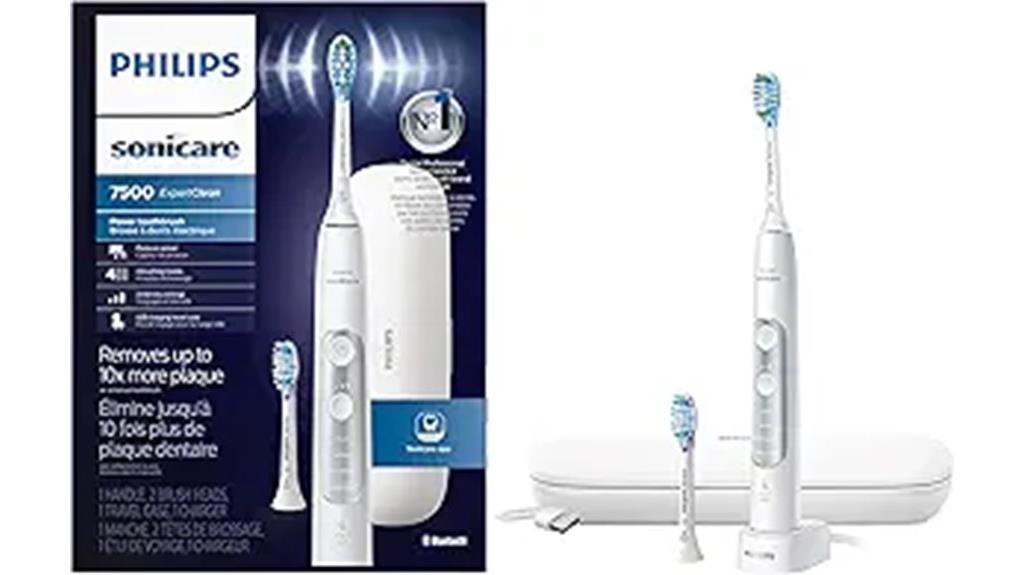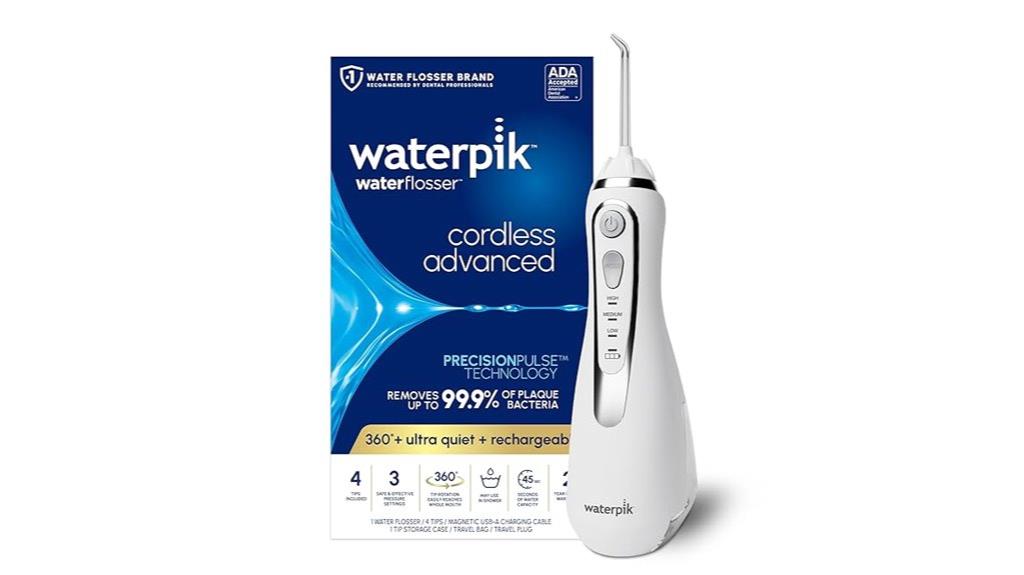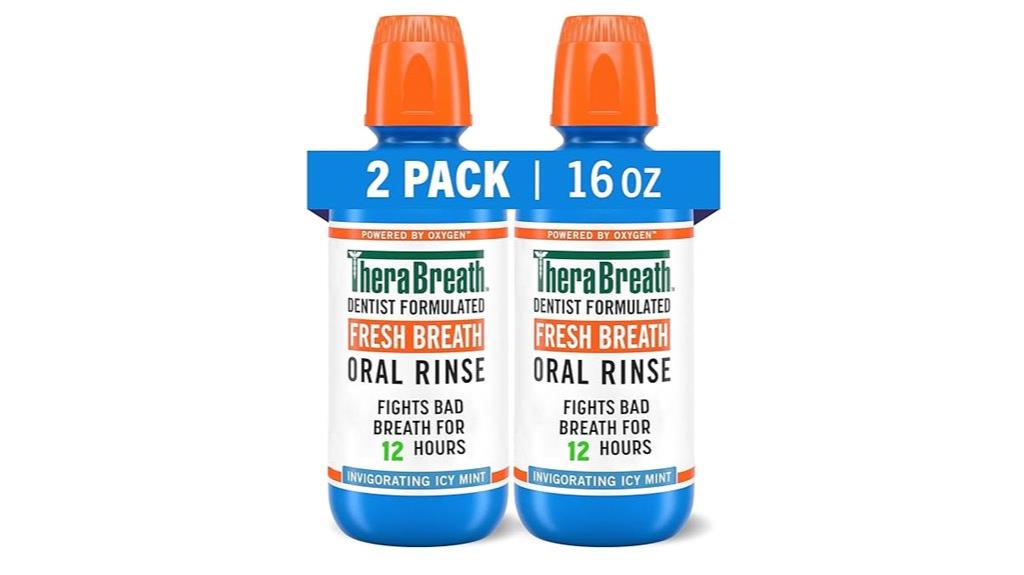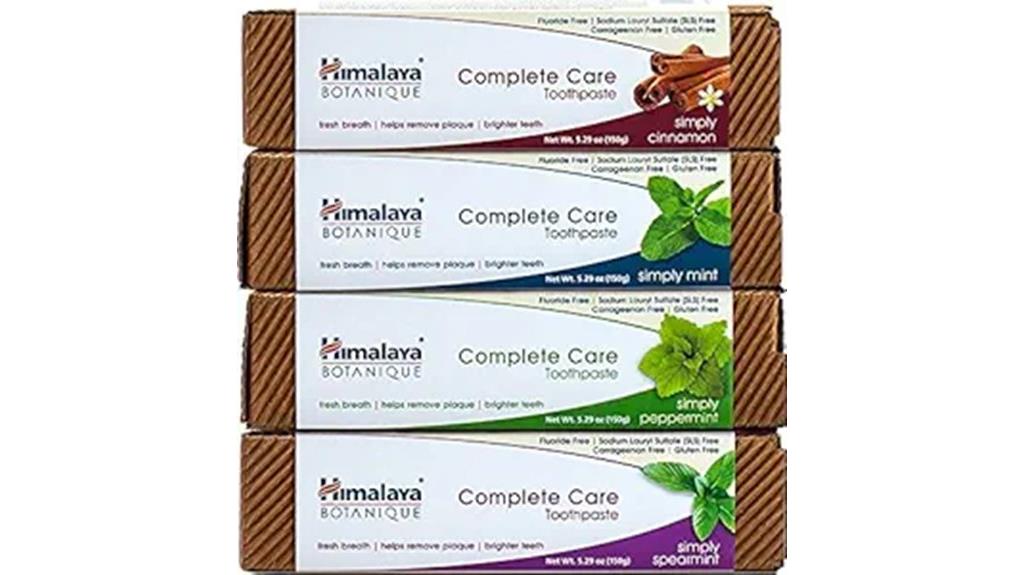Imagine a young African American mother, Tasha, struggling to instill good oral hygiene habits in her children while battling her own dental issues. You’re not alone if you find yourself in a similar situation. Many African American families face unique oral health challenges, from higher risks of periodontal disease to increased susceptibility to oral cancer. But don’t worry – with the right knowledge and preventive care strategies, you can protect your family’s smiles for years to come. Let’s explore some essential tips that’ll help you navigate these challenges and maintain ideal dental health.
Understanding Unique Oral Health Challenges

For African American families, understanding the unique oral health challenges they may face is vital for maintaining good dental health.
You’re more likely to experience certain dental issues due to genetic and environmental factors. For instance, you have a higher risk of developing periodontal disease, which can lead to tooth loss if left untreated.
You’re also more prone to oral cancer, particularly if you use tobacco products. In addition, sickle cell anemia, which is more common in African Americans, can affect your oral health by causing jaw pain and increasing the risk of infection.
Your diet and lifestyle choices can impact your dental health too. High-sugar diets and lack of access to dental care in some communities can contribute to higher rates of tooth decay.
Moreover, you may be more likely to develop vitamin D deficiency due to darker skin pigmentation, which can affect tooth and bone health.
Understanding these challenges allows you to take proactive steps in your dental care routine. Regular check-ups, a balanced diet, and proper oral hygiene practices are essential in addressing these unique concerns and maintaining a healthy smile.
Proper Brushing Techniques
Mastering proper brushing techniques is essential for maintaining ideal oral health. To effectively clean your teeth, use a soft-bristled toothbrush and fluoride toothpaste. Hold your brush at a 45-degree angle to your gums and gently move it back and forth in short strokes. Be sure to brush the outer, inner, and chewing surfaces of all teeth.
Don’t forget to clean your tongue, as it can harbor bacteria. Use your toothbrush or a tongue scraper to remove buildup. Brush for at least two minutes, twice a day – morning and night. Consider using an electric toothbrush, which can be more effective at removing plaque.
Replace your toothbrush every three to four months or sooner if the bristles become frayed. If you wear braces or have other dental appliances, use special brushes designed for cleaning around them.
For children, supervise brushing until they can properly clean their teeth on their own, usually around age seven or eight.
Flossing for Healthier Gums
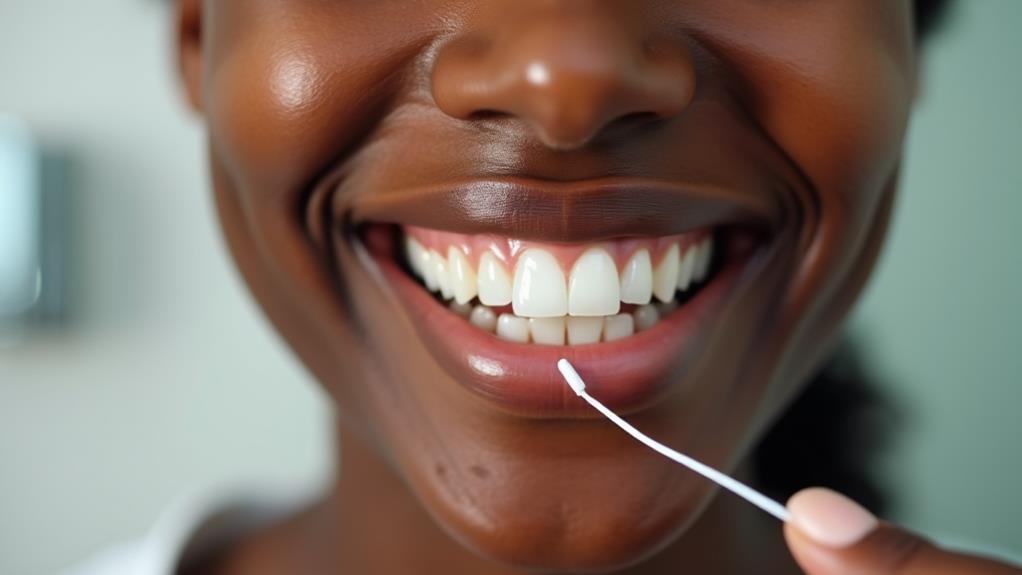
While brushing is essential, it’s not enough on its own to maintain ideal oral health. Flossing plays an important role in removing plaque and food particles from between your teeth and along the gum line, where your toothbrush can’t reach effectively.
To floss properly, start with about 18 inches of floss. Wind most of it around your middle fingers, leaving a few inches to work with. Gently slide the floss between your teeth, forming a C-shape around each tooth. Move the floss up and down, making sure to go below the gum line.
For African American families, flossing is particularly important. Studies have shown that African Americans are at higher risk for gum disease due to various factors, including genetics and higher rates of diabetes. Regular flossing can help combat this increased risk by removing bacteria that cause gum inflammation.
Aim to floss at least once a day, preferably before bedtime. If you find traditional floss challenging, consider alternatives like floss picks or water flossers. These tools can make the process easier and more comfortable, especially for children or those with dexterity issues.
Diet and Oral Health
A balanced diet plays an essential role in maintaining good oral health. For African American families, focusing on nutrient-rich foods can help strengthen teeth and gums.
You’ll want to incorporate plenty of calcium-rich options like leafy greens, low-fat dairy products, and fortified plant-based milk alternatives to support strong tooth enamel.
Vitamin C is vital for gum health, so include citrus fruits, berries, and bell peppers in your meals.
Don’t forget about vitamin D, which aids calcium absorption; try fatty fish, egg yolks, and fortified cereals.
Crunchy fruits and vegetables like apples and carrots can help clean teeth naturally and stimulate saliva production.
Be mindful of sugary and acidic foods that can erode enamel and contribute to tooth decay. Limit sodas, sports drinks, and sticky candies.
When you do consume these treats, rinse your mouth with water afterward.
Opt for sugar-free gum containing xylitol, which can help reduce cavity-causing bacteria.
Fluoride: Friend or Foe?

How does fluoride impact oral health in African American communities? Fluoride plays a vital role in preventing tooth decay, which disproportionately affects African Americans. It strengthens tooth enamel, making it more resistant to acid attacks from plaque bacteria and sugars in the mouth.
You’ll find fluoride in many sources, including tap water, toothpaste, and professional dental treatments. In areas with fluoridated water, you’re already getting some protection. However, it’s important to use fluoride toothpaste and rinses for added benefits.
Some concerns have been raised about fluoride’s safety, but scientific evidence overwhelmingly supports its use. The American Dental Association and the CDC endorse fluoride as a safe and effective way to prevent cavities.
For African American families, embracing fluoride can help address oral health disparities. It’s particularly significant for children, as their developing teeth benefit greatly from fluoride exposure.
If you’re unsure about your community’s water fluoridation status or have concerns, consult your dentist. They can provide personalized advice and fluoride treatments if needed, ensuring your family reaps the full benefits of this cavity-fighting mineral.
Regular Dental Check-ups
Scheduling regular dental check-ups is essential for maintaining ideal oral health in African American families. You should aim to visit your dentist every six months for routine examinations and cleanings. These appointments allow your dentist to detect and address potential issues early, preventing more serious problems down the line.
During your check-up, your dentist will examine your teeth, gums, and mouth for signs of decay, gum disease, or other oral health concerns. They’ll also perform a professional cleaning to remove plaque and tartar buildup that can’t be eliminated through regular brushing and flossing at home.
For African American families, regular dental visits are particularly important due to higher rates of certain oral health issues within the community. Your dentist can provide personalized advice on preventing conditions like gum disease and tooth decay, which are more prevalent among African Americans.
Don’t forget to discuss any concerns or changes in your oral health with your dentist during these appointments. They can offer guidance on proper brushing techniques, recommend appropriate oral care products, and suggest dietary adjustments to support your family’s dental health.
Addressing Dry Mouth Issues

Dry mouth frequently affects African Americans, particularly those taking certain medications or undergoing medical treatments. This condition, known as xerostomia, can lead to increased risk of tooth decay, gum disease, and oral infections. To address dry mouth issues, you’ll need to take proactive steps to maintain oral health.
First, stay hydrated by drinking plenty of water throughout the day. Chewing sugar-free gum or sucking on sugar-free candies can stimulate saliva production. You might also consider using artificial saliva products or oral moisturizers recommended by your dentist.
Be mindful of your diet, avoiding foods and drinks that can worsen dry mouth, such as caffeine, alcohol, and sugary or acidic items. Instead, opt for foods that promote saliva production, like crunchy fruits and vegetables.
If you’re taking medications that cause dry mouth, consult your doctor about possible alternatives or adjustments to your dosage. They may also prescribe saliva-stimulating medications if necessary.
Maintain excellent oral hygiene by brushing twice daily with fluoride toothpaste and flossing regularly. Use an alcohol-free mouthwash to avoid further drying out your mouth.
Don’t forget to schedule regular dental check-ups to monitor and manage dry mouth issues effectively.
Combating Tooth Sensitivity
African Americans’ tooth sensitivity can considerably impact daily life, causing discomfort when consuming hot, cold, sweet, or acidic foods and drinks. To combat this issue, you’ll need to take proactive steps to protect your teeth and reduce sensitivity.
First, switch to a desensitizing toothpaste containing potassium nitrate or strontium chloride. These ingredients help block pain signals from your teeth to your nerves. Brush gently with a soft-bristled toothbrush and use fluoride mouthwash to strengthen your enamel.
Consider these lifestyle changes to reduce tooth sensitivity:
- Avoid acidic foods and drinks like citrus fruits, sodas, and wine.
- Use a straw when drinking cold beverages to bypass sensitive teeth.
- Wait 30 minutes after eating before brushing to protect softened enamel.
- Wear a mouthguard if you grind your teeth at night.
If sensitivity persists, consult your dentist. They may recommend in-office treatments like fluoride varnishes, bonding agents, or even gum grafts for severe cases.
Oral Health During Pregnancy

Pregnancy brings unique challenges to oral health for African American women. You’re more susceptible to gum disease and tooth decay during this time due to hormonal changes and increased acidity in your mouth. It’s essential to maintain excellent oral hygiene and visit your dentist regularly.
Brush twice daily with fluoride toothpaste and floss at least once. If morning sickness causes vomiting, rinse your mouth with water or a fluoride mouthwash to neutralize acid. Don’t brush immediately after vomiting, as this can erode enamel.
Your diet plays a significant role in oral health during pregnancy. Limit sugary snacks and drinks, opting for nutrient-rich foods instead. Calcium-rich foods like leafy greens and low-fat dairy products help strengthen your teeth and your baby’s developing teeth.
Don’t skip dental check-ups; inform your dentist about your pregnancy. They may recommend more frequent cleanings to prevent gum disease. If you need dental work, the second trimester is usually the safest time.
X-rays should be avoided if possible, but if necessary, your dentist will take precautions to protect you and your baby.
Join The Discussion
How do you encourage good dental habits in your household? Share your tips, favorite products, or experiences to inspire others in the community.

Maintain radiant smiles and optimal oral health with these trusted tools and natural solutions tailored to the unique needs of your family.



